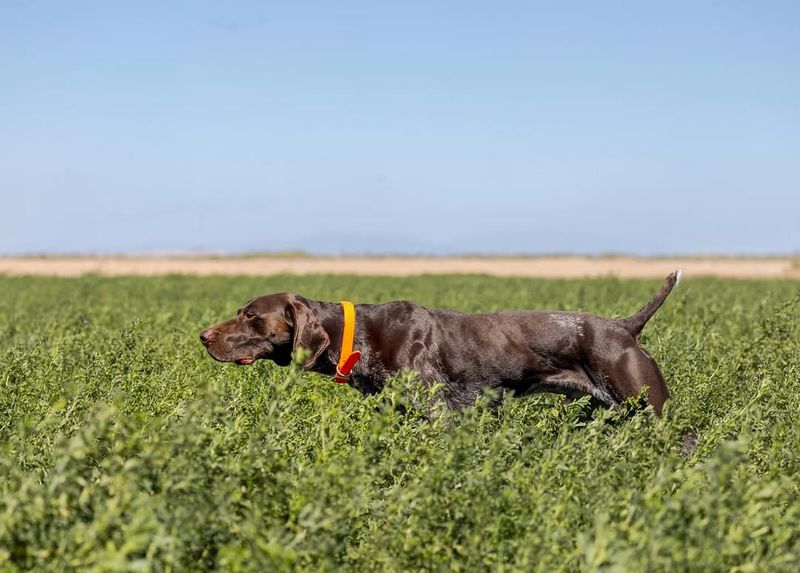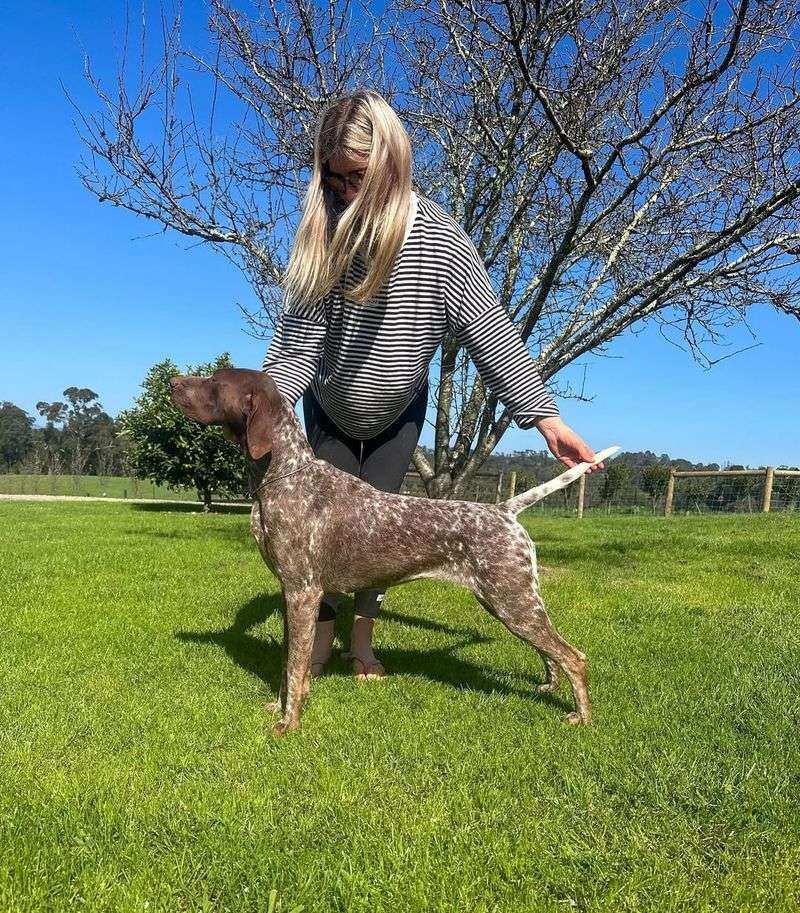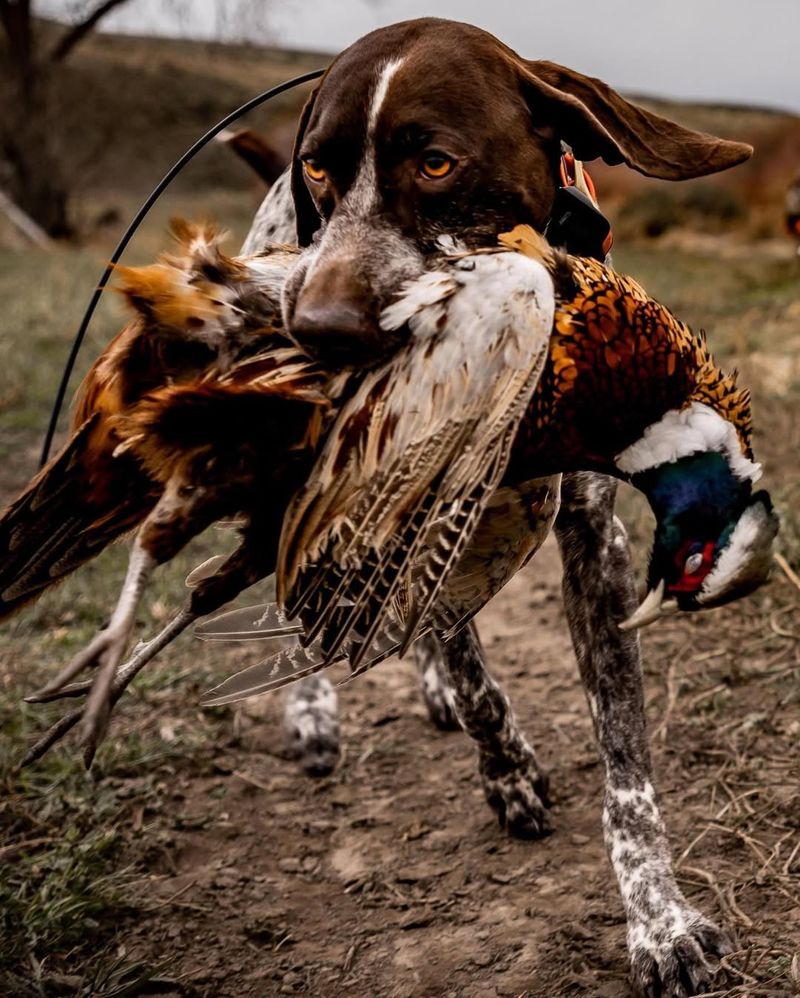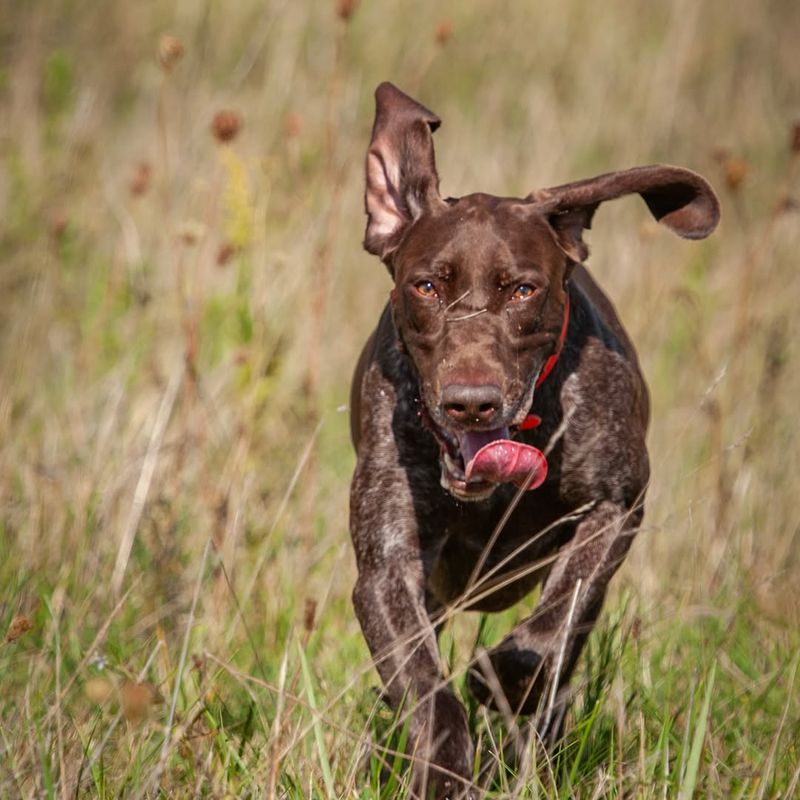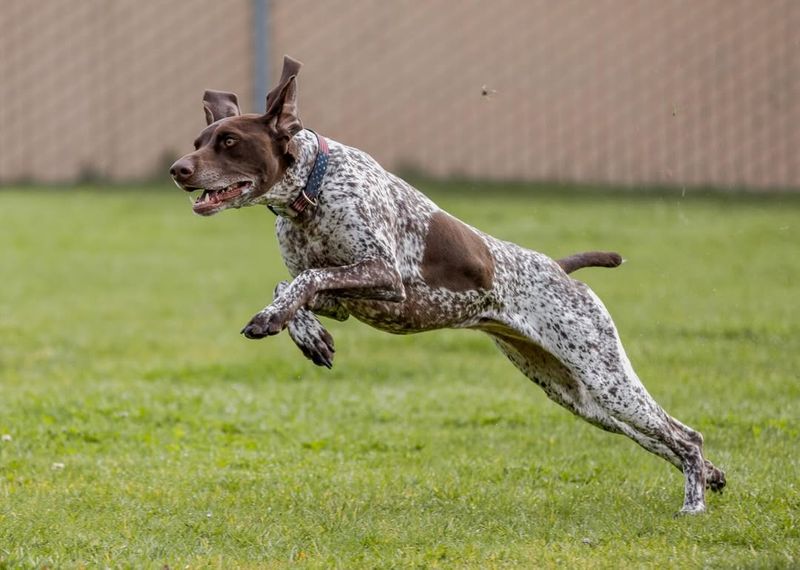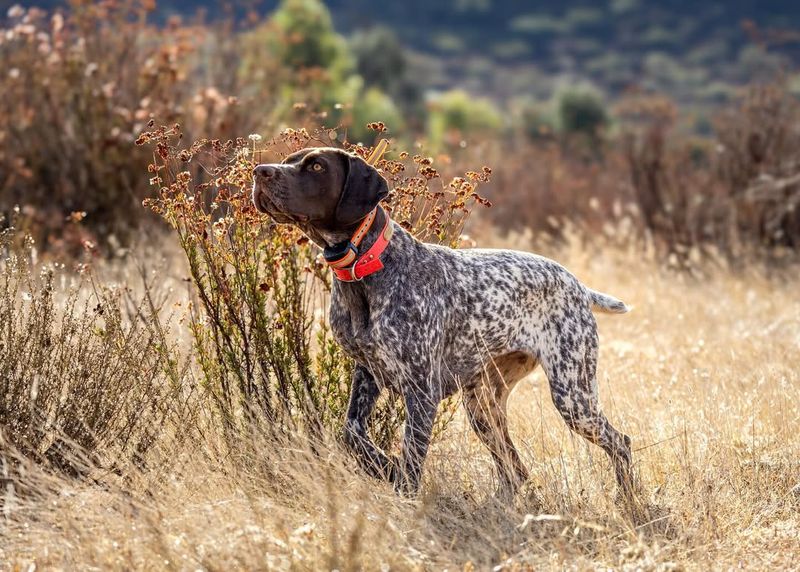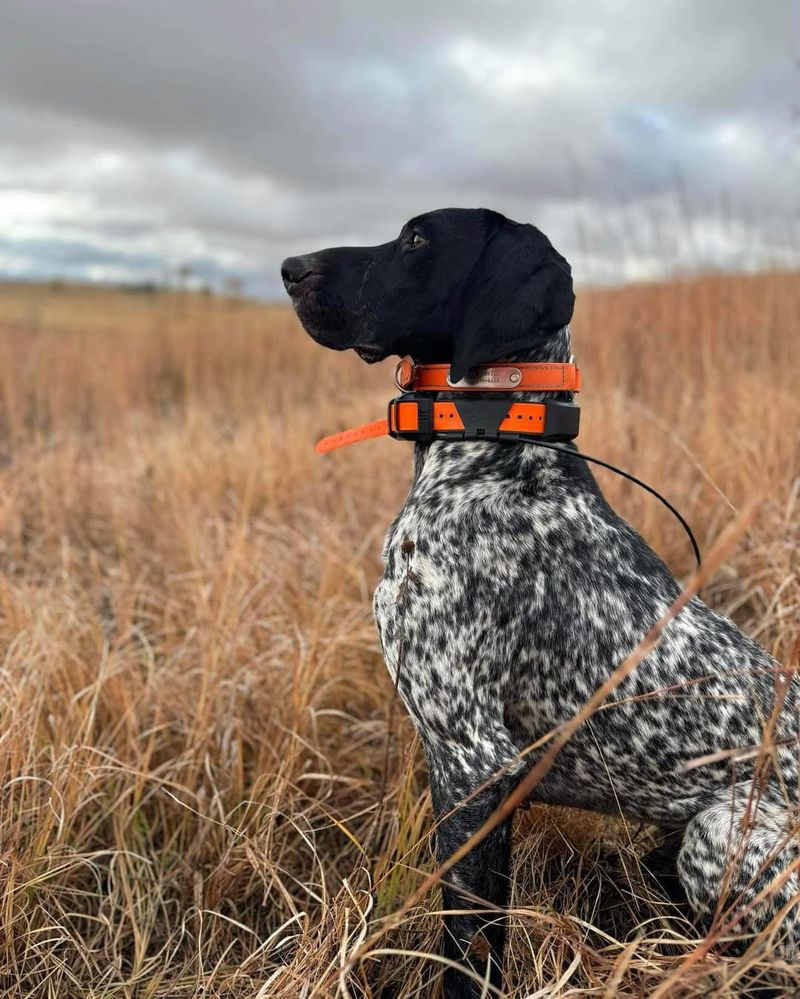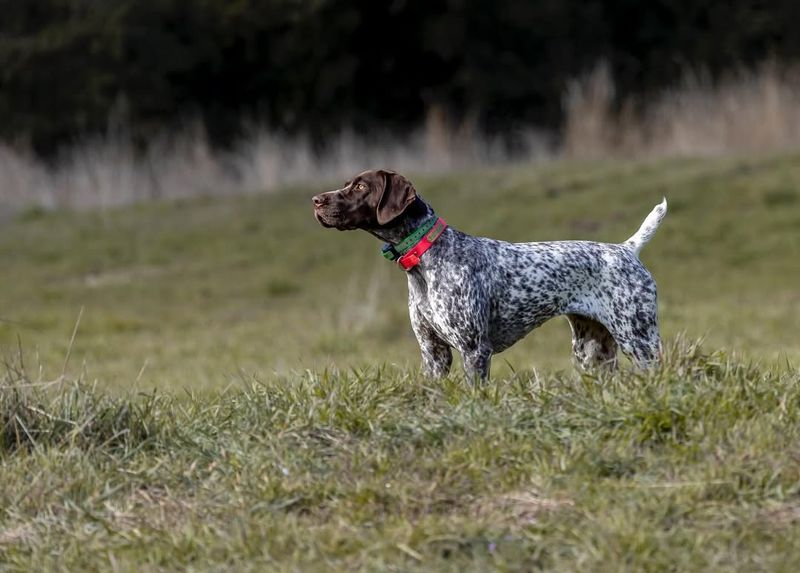German Shorthaired Pointers are energetic and versatile dogs known for their hunting skills and companionship. However, they are not suited for everyone. Understanding the advantages and challenges of owning this breed can help you make an informed decision. Here are 22 pros and cons to consider, offering a balanced view of what life with a German Shorthaired Pointer might look like.
Energetic and Active
German Shorthaired Pointers (GSPs) are brimming with energy and enthusiasm. Their lively nature makes them ideal companions for active individuals. A daily routine filled with exercise keeps them happy and healthy. These dogs thrive on physical activities like jogging, hiking, or playing fetch. They need ample space and time to burn off their energy, making them perfect for those living near parks or open spaces. However, this trait might be challenging for potential owners with a sedentary lifestyle. Providing consistent activities ensures a harmonious relationship with these vibrant dogs.
Intelligent and Trainable
Known for their intelligence, GSPs are quick learners and highly trainable. Their eagerness to please makes them responsive to training sessions. Positive reinforcement techniques work wonders, enhancing their learning experience. This intelligence also means they can pick up bad habits if not guided correctly. Consistent training and mental stimulation are crucial to keeping their minds sharp and engaged. Owners can enjoy teaching them various tricks and commands, strengthening their bond. Yet, a lack of training can lead to behavioral issues, making early education essential for a well-mannered companion.
Friendly and Social
GSPs are known for their friendly and social demeanor. They tend to get along well with people and other pets, making them excellent family dogs. Their affectionate nature is a joy to families with children. These dogs are happiest when surrounded by loved ones, thriving in environments where they can socialize freely. However, they might become overly attached, leading to separation anxiety when left alone for extended periods. Regular interaction and companionship help them feel secure and content, fostering a strong and loving bond with their human family.
Versatile Hunting Companion
German Shorthaired Pointers excel as versatile hunting companions. Their keen sense of smell and agility make them adept at tracking and retrieving game. Hunters appreciate their reliability and endurance in various terrains. These instincts require channeling through proper training, ensuring they don’t become troublesome pets. For those interested in field sports, GSPs offer an enriching partnership. Yet, owners not engaged in hunting activities need to provide alternative outlets for their instincts. Training in obedience or agility can satisfy their natural drive, ensuring they remain content and well-behaved.
Minimal Grooming Needs
GSPs have short, sleek coats requiring minimal grooming, making them low-maintenance in terms of grooming. Regular brushing keeps their coat healthy and shiny. Their grooming routine is simple, needing only occasional baths and nail trims. This ease benefits owners looking for a dog that doesn’t require constant upkeep. However, they do shed moderately, which might not suit allergy sufferers. Regular cleaning can minimize shedding around the home. Overall, their grooming simplicity is a plus for those seeking an uncomplicated care routine.
Great with Kids
German Shorthaired Pointers are often great companions for children, known for their gentle and patient nature. Their love for play aligns well with kids’ energy, creating a joyful environment. Supervision is advised during interactions to ensure safe and positive experiences. GSPs’ protective instincts also extend to children, though they must be taught boundaries. Families looking for a loyal and playful dog will find GSPs a delightful addition. Still, proper socialization and training from an early age ensure harmony between the dog and the children, fostering mutual respect and companionship.
Requires Regular Exercise
GSPs demand regular and vigorous exercise to maintain their physical and mental well-being. Daily activities such as long walks or runs are essential to keep them content. Without adequate exercise, they may develop behavioral issues like restlessness or anxiety. Owners must commit to an active lifestyle, integrating exercise into their daily routines. This commitment ensures a balanced and happy dog, ready to participate in various activities. Prospective owners should evaluate their ability to meet these needs before bringing a GSP home, ensuring a harmonious living situation for both.
Prone to Separation Anxiety
GSPs can be prone to separation anxiety due to their strong attachment to family members. They thrive in environments where they receive constant companionship. Long periods alone can lead to destructive behaviors or excessive barking. Owners need strategies to manage this, such as gradual desensitization or providing engaging toys. Arranging dog sitters or daycare can also help during extended absences. Understanding this potential issue and preparing accordingly ensures GSPs remain secure and content, preventing anxiety-related problems and promoting a serene household environment.
Barking Tendency
German Shorthaired Pointers have a tendency to bark, which can be both a pro and a con. Their alertness makes them excellent watchdogs, alerting owners to potential intrusions. However, excessive barking can be an issue if not managed. Training from an early age helps mitigate this behavior, ensuring it remains within acceptable limits. Understanding triggers and providing distractions can also assist. While their vocal nature can deter intruders, it might not suit everyone, especially in quiet neighborhoods. Addressing barking tendencies through training ensures harmony between the dog and its community.
High Energy Levels
GSPs are renowned for their high energy levels, requiring significant physical activities to remain content. Daily exercise is non-negotiable to prevent restlessness. Their energy can be exhausting for owners not prepared for an active companion. However, for those willing to engage in outdoor adventures, these dogs make excellent partners. Activities like agility training or marathon running can satisfy their energy needs. Prospective owners must assess their ability to provide this active lifestyle. Ensuring adequate outlets for their energy fosters a balanced and harmonious relationship, making them rewarding companions for the active individual.
Challenging Without Training
Without proper training, GSPs can become challenging pets. Their intelligence and curiosity might lead to undesirable behaviors if not guided correctly. Training provides structure, ensuring they understand boundaries and commands. Owners should invest time in consistent training sessions, fostering positive behaviors. Early socialization is also crucial, enhancing their adaptability to various environments. Neglecting training can lead to unruly behavior, making life difficult for both the dog and owner. Commitment to training ensures a well-mannered companion, capable of integrating smoothly into family life and social situations, enhancing the joy of ownership.
Strong Prey Drive
German Shorthaired Pointers have a strong prey drive, making them excellent hunters but requiring mindfulness in pet ownership. This instinct means they might chase smaller animals, including neighborhood pets. Owners must provide secure environments and training to manage this drive. Leash training and recall commands are essential to mitigate potential issues. For hunting enthusiasts, this trait is beneficial, aligning with field activities. However, it necessitates cautious handling around small animals. Understanding and managing their prey drive through training allows for a balanced relationship, ensuring safety for all involved.
Adaptable to Various Environments
GSPs are adaptable dogs, thriving in diverse environments. Whether in a city apartment or rural farmhouse, they can adjust to different living conditions with proper care. Their adaptability, however, doesn’t negate their need for exercise and mental stimulation. Owners in urban settings must ensure they receive adequate outdoor time and activities. This flexibility makes them suitable for various lifestyles, provided their basic needs are met. Families seeking a versatile companion will find this trait appealing, as long as they commit to fulfilling their physical and emotional requirements.
Affectionate Nature
The affectionate nature of GSPs makes them loving and loyal companions. They form strong bonds with their families, often seeking close contact and companionship. This loving disposition is a source of joy and comfort, making them excellent emotional support animals. However, their desire for attention might be overwhelming for those preferring more independent pets. Owners must embrace their need for closeness, reciprocating affection to maintain a balanced relationship. Understanding and nurturing their affectionate nature ensures a fulfilling companionship, where both dog and owner thrive in a supportive and loving environment.
Prone to Certain Health Issues
German Shorthaired Pointers can be prone to certain health issues, including hip dysplasia and eye conditions. Regular veterinary check-ups are essential to monitor their health and catch any issues early. Awareness and proactive care contribute to their longevity and well-being. Prospective owners should research common health concerns, ensuring they are prepared for potential medical needs. A balanced diet and regular exercise play crucial roles in maintaining their health. Being informed and vigilant aids in preventing or managing health problems, allowing GSPs to lead happy and healthy lives alongside their families.
Moderate Shedding
GSPs experience moderate shedding, requiring regular grooming to manage loose hair. While their short coat is low-maintenance, shedding can be more noticeable during seasonal changes. Regular brushing helps minimize shedding and keeps their coat healthy. For some, this shedding might be a drawback, especially for allergy sufferers. However, a consistent grooming routine can make this manageable. Owners must be prepared for some hair around the home, implementing cleaning strategies to maintain a tidy environment. Overall, their shedding is moderate and manageable with a little extra attention to grooming.
Occasional Stubbornness
GSPs can exhibit occasional stubbornness, challenging owners during training sessions. Their intelligence sometimes leads them to question commands. Patience and consistency are key in overcoming this trait. Positive reinforcement and varied training activities engage their interest and cooperation. Understanding their independent streak helps in managing their stubborn moments. While it can be frustrating, it’s also an opportunity to build a stronger bond through shared learning experiences. Recognizing and adapting to their stubborn tendencies ensures effective training and a harmonious relationship, making them rewarding companions for dedicated and understanding owners.
Excellent Swimmers
GSPs are excellent swimmers, enjoying water activities and excelling in aquatic environments. Their webbed feet and athletic build contribute to their prowess in swimming. Owners with access to lakes or pools can enjoy shared water adventures, enhancing physical activity for both dog and owner. However, safety precautions are essential, ensuring they swim in secure and supervised areas. For water-loving families, GSPs offer a joyful addition, participating in various water sports. Understanding and nurturing this natural ability allows for enriching experiences, strengthening the bond through shared aquatic activities and adventures.
Requires Mental Stimulation
Mental stimulation is crucial for GSPs, alongside physical exercise. Their intelligence demands engaging activities to prevent boredom and related behavioral issues. Puzzle toys, training exercises, and interactive games provide necessary mental challenges. Owners should integrate these activities into daily routines, ensuring a balanced and contented dog. Ignoring their mental needs can lead to destructive behaviors, making stimulation an essential part of their care. For those willing to invest time in mental enrichment, GSPs offer rewarding companionship, displaying their sharp minds and joyful spirits through engaging and fun activities.
Loyal and Protective
Loyalty and protectiveness are hallmark traits of GSPs. They form deep bonds with their families, often taking on protective roles within the household. This loyalty provides a sense of security, knowing they will alert owners to any unusual occurrences. While their protectiveness is generally positive, it must be managed to prevent over-guarding behaviors. Proper socialization and training help maintain a balanced approach to their protective instincts. Understanding and nurturing these traits ensures a loving and secure environment, where the GSP acts as both a loyal companion and vigilant guardian.
Not Suited for All Climates
GSPs are not suited for extreme climate conditions, particularly harsh cold without proper protection. Their short coat provides minimal insulation against severe weather. Owners in colder regions must provide warm shelter and protective clothing during winter months. Conversely, in hot climates, ensuring access to shade and water is crucial to prevent overheating. Understanding their climate needs helps in providing suitable living conditions. For those in temperate regions, their adaptability shines. However, potential owners in extreme climates must prepare to meet their environmental needs, ensuring their comfort and well-being year-round.


